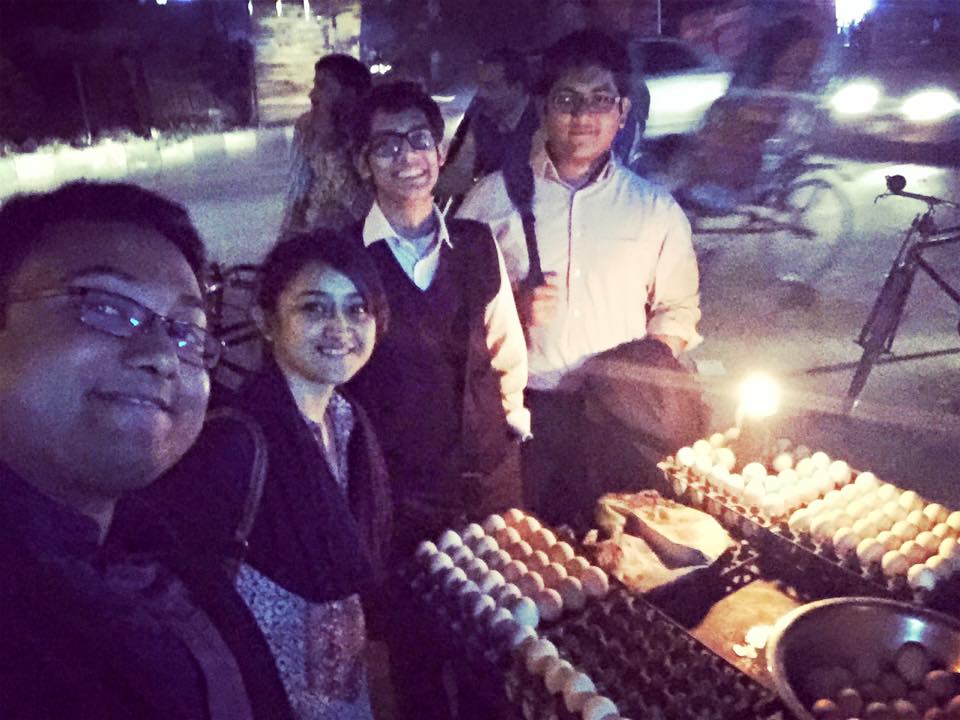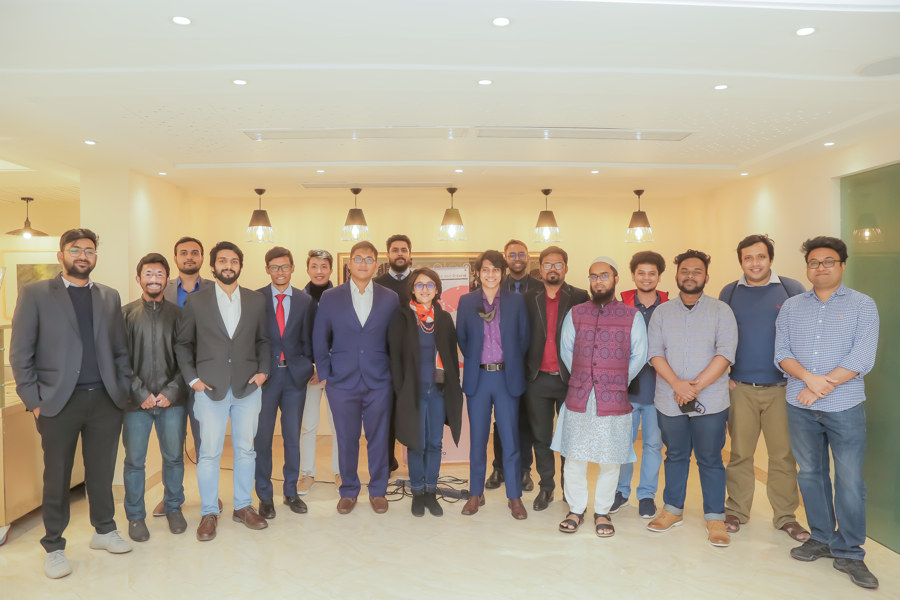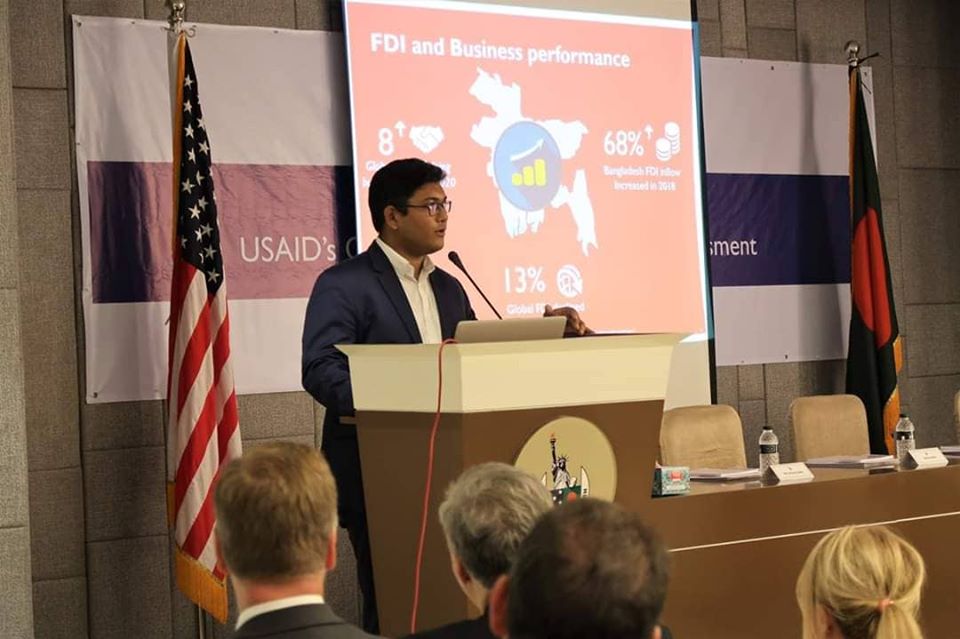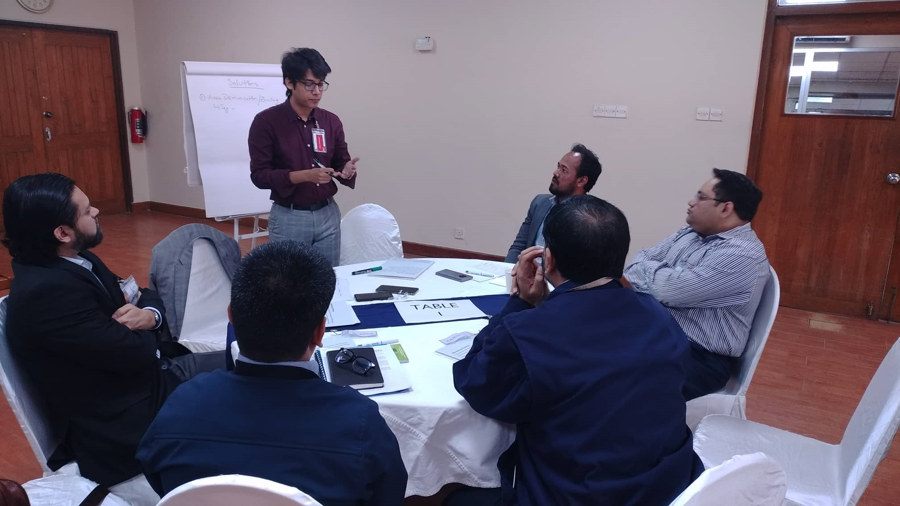
Muntasir Tahmeed is the co-founder and Managing Director of Inspira Advisory and Consulting Ltd, a Dhaka-based research and consulting firm that helps bi-lateral donors, UN agencies, and Nonprofits to design better-informed, data-driven interventions. Founded in 2015, Inspira has experienced excellent growth within a short period of time and has quickly become a leading player in the space.
In this wide-ranging interview with Future Startup’s Ruhul Kader, Mr. Muntasir offers an insight into his journey, the making of Inspira, and the ecology of building a research and consulting business in Bangladesh. We talk about his path to entrepreneurship, how Inspira came into being, the early days of building the company, delve into the making of Inspira and how the company has evolved and grown over the past years, discuss the operational mechanics of the business, the state of Inspira today and its ambition going forward, his take on the ecology of the consulting business in Bangladesh and lessons from his entrepreneurial journey so far and much more.
This was a much longer interview. So we had to break it down into two parts. This is part one of the interview. Please return later this month for the next installment of the interview.
Future Startup: Thank you for agreeing to this interview. Could you please tell us about your background and journey to what you are doing today?
Muntasir Tahmeed: Inspira was formally registered as a company on 15 February 2015. But the story started long before in 2011 when I had just started my undergrad at a business school. I was working part-time in the advertising industry then.
Although the concept of start-ups or entrepreneurship was not as buzzing at that point, there was an emerging trend of student-led boutique service platforms (mostly in digital marketing, audio-visual production, and reporting-documentation verticals).
I saw that the market was growing, SMEs, in particular, were subscribing to those service platforms. so I decided to give it a try, launch such a boutique, and find some work.
Within a short period, I got some opportunities to work with several local brands. I was empowered by the experience and my perspective changed about work and career.
Future Startup: When did you get the feeling that a typical 9-5 job is not your thing and you have to do something of your own?
Motasir Tahmeed: I think it was a ‘chance’ realization! To run a part-time gig, maybe an income-generating service platform besides studies is easy. But it is very difficult to make that decision (to continue with entrepreneurship) at the end of graduation.
We were just graduating from IBA-DU at the end of 2014, most of my friends had already started receiving offer letters from big-name MNCs and I was in a dilemma as to which path to stick to.
I guess eventually I took the chance and kept on building a business! This ‘chance decision’ may also be linked to my background and upbringing and the hurdles I had to tackle in the process.
I was born and raised in Chittagong. My school was Chittagong Government High School and my college was Govt. Hazi Mohammad Mohsin College. Life in Chittagong was never as fast-paced as Dhaka. When I came to Dhaka in 2011 for my admission test (at the university) it was only my 3rd or 4th visit to the capital. The experience of seeing how Dhaka operates made me realize that there was a gulf of difference between the calm and slow-paced Chittagong vs. the continuous hustle-bustle of Dhaka.
Moreover, I did not have any ‘work’ or ‘business’ network in Dhaka as I just set foot in this busy city! I was feeling a bit lost too. That pushed me to think about building my network, which led to an interesting idea. I started to pick walk-in interviews from newspapers randomly and go to those interviews. The logic: I would get a chance to meet industry people and build some connections. Since I had no undergraduate degree, I used to get disqualified after every interview — in many cases, even before the interview would start (at the time of certificate submission, as I did not have any university-level degree then).
This brief and rather ‘unusual’ networking experiment ended soon without much fruition in network development but I got a flavor of the busy commercial centers of downtown Dhaka — I would say even that was an ‘achievement’ for a small-town kid like me. And as I come to think of it now, I am amazed to see how desperate my younger self was — to hustle and stride through the clutter of Dhaka!
Then I tried joining advertising agencies with limited success. After the first semester, which was mid-2011, I came to learn about consulting business and started to follow some consulting firms on social media, kept on reading interviews of the senior partners/directors from the famous consulting giants, and started scanning to identify opportunities in Bangladesh.
In the meantime, my academic life was also continuing. I started participating in debate tournaments and business competitions. One very interesting event during that timeline (1st year at the university I think!) marked the beginning of my entrepreneurial journey. I along with four of my friends won the national level of an international business competition and was selected for the regional leg of the tournament scheduled to happen in Shanghai. However, the organizers did not sponsor us. We needed approximately 500,000 BDT for the team for arranging the journey to Shanghai. None of us wanted to ask our parents for the money — we wanted to arrange it ourselves-somehow!
After much thought, we had come up with an idea. The central theme of that international competition was “Addressing Urban Housing Problem”. So our team decided that we would go to different real estate companies to get sponsorship for our trip to Shanghai. Just closing in on our first semester, we did not have any link in the sector. We started with cold calls, office visits (with and without appointments), LinkedIn messaging, email, and whatnot. Fortunately, we ended up connecting with one of the local real estate companies via a dear boro bhai, Mr. Rokan. That company took a real interest in the matter and eventually approved sponsorship for the whole team!
Unfortunately, during this process of hunting down that company, we could not manage our Chinese VISA on time. Think about it! A bunch of fresh undergrads gets a nod from a local realtor for 5 lac taka sponsorship but miss that ‘all-expenses-paid tour.
Later, the director invited us over and told us ‘we have already sanctioned the money. You tell me what value you can add so that we can ‘pay’ you the money’. We just finished a course at the university on the principles of marketing and we immediately expressed our interest to work with the marketing team of that organization to create brand development strategies, maybe even without knowing much about ‘brand’ or ‘brand development.
The deal was that our team would visit their office three days a week in the 2nd half (after classes), collaborate with their ‘one-man-army brand/marketing person, identify gaps in the brand strategies and recommend improvement areas. We were just novices in that sector starting with writing mere contents for their brochures but soon we could catch the drift and started contributing in collecting customer insights from the market, conducting competition scanning, and eventually coming up with ‘first-in-the-sector’ customer engagement ideas.
We went on to continue our work at that organization for close to 7-8 months, learned how local organizations work in Bangladesh, identified the need for strategic research/knowledge-based support for their management decisions, and eventually realized that at some point in the future it would make sense to launch a consulting firm, even in Bangladesh!
We then began to explore different research service providers in Bangladesh to understand the market and the services they offer. Mr. Minhaz Anwar, a consulting sector pioneer in Bangladesh (and also my uncle!) guided us to navigate through the industry, connect with the right persons and clients at that point.
We reached out to a few of the local consulting/research organizations and started writing proposals on their behalf. It was a simple deal: if our project proposals were accepted, we would receive a certain amount of money. I was in my second-third year at the university. Our proposals were mostly rejected for the first few months but started to get accepted in the later pursuits. Although we used to write those proposals, it was not our own company getting the assignments — this was a constant itchiness on the back of our head.
In 2014, during the final year of our undergrad, we decided to submit a series of proposals on our own. Note that we did not officially register our organization even then but we wanted to take a chance. The guiding thought was that if we are selected for a consulting or research assignment on our own, we would use a portion of the research grant to register ourselves as a formal organization with a trade license and all. Fortunately, we had been selected for one such assignment and the client allowed us to process all the necessary legal/compliance documents utilizing a portion of their fund. We started the registration process but we were at the end of our final year and MNCs started campus recruitment.
The friends of mine, who played an instrumental role in shaping up these budding years of my entrepreneurial journey: Ayesha, Hisham, Nahian, Amitabh, and Mashfiq; all of them were fantastic talents and exciting prospects for any organization. Within a span of a few months, all of them joined renowned corporations of the country. So I was wondering whether I should register the company or take a job.
I was going through a phase of confusion. I needed to take a call on my choice of career where on one side there was that ever enchanting, glorious ‘corporate lifestyle’ and on the other side, an uncertain path of entrepreneurship.
I met three very important people for the next phase of my journey at that point: Samira Zuberi Himika (who was one of the very early stage curators of Bangladesh entrepreneurship ecosystem then and an accomplished IT sector businesswoman now), Nasim Ul Haque Raad (a senior from IBA who just left his corporate job in pursuit of a more meaningful journey then and an accomplished academician with an Oxford MBA now) and Salman Rahman (my batchmate from IBA who believed in my journey towards entrepreneurship and joined the company as the first team member then and one of the Directors now).
I guess it was the ‘never say never’ mentality of this group of people that eventually pushed me at that crucial stage of life and helped me in choosing the path of entrepreneurship.

Future Startup: Who were your clients in the beginning?
Muntasir Tahmeed: We launched Inspira consulting with the vision to work at nascent, early growth stage, and new-age industries or sectors where we will have the option to add value by extracting insights on the yet-to-emerge opportunities.
Initially, we selected a few sectors to focus on, such as the blue economy (ocean-based economic activity), creative economy (film industry, music industry, digital media, etc.), Islamic economy, Digital economy, etc.
However, we quickly discovered that the majority of the sectoral stakeholders weren't ready in 2015 to appreciate the research or sectoral knowledge in such advanced/niche areas. In a nutshell, our preliminary approach did not have the right ‘product-market fit’,
Future Startup: How did you respond when you found out that the market was not ready for your services?
Muntasir Tahmeed: Before arriving at the conclusion that our approach had a flaw, we actually did a quick scan of the market interest. We identified the probable buyers of research services across each sector, prepared a concept note of a knowledge product (MVP equivalent in consulting industry?!), and sat with the key decision-makers to hear their perspectives. For each of the sectors we initially identified, we conducted interviews with at least 5-6 stakeholders. Most of them did not express any interest to commission any assignment.
But in the process of this series of discussions, we could identify the need for other niche services in the market. Industry associations such as BASIS, BACCO, BGMEA organize many international conferences. We identified an opportunity to work in those conferences as knowledge partners — developing the keynote presentations and sectoral whitepapers in collaboration with the association leaders and sector experts.
Although we started with the high ambition of working at new-age industries to provide top-notch strategy consulting services, we could not convince clients to pay for those ‘niche’ strategy consulting projects. Instead, we found an opportunity which we did not have in our original plan.
Before Inspira, I had three other businesses. In my third year at university, I tried two businesses. One of them was SlideUp, where we helped private executives prepare excellent presentations. We also partnered with BDJobs and other platforms to teach people how to make animated presentations. So I had a history of working and training people on Powerpoint. I leveraged that and pitched the idea to industry associations to make better presentations for them helping them to get investors.
We designed a pricing strategy to ensure frequent work for a competitive price. The first year of Inspira was all about working with industry associations. We did zero consulting work that year.
Future Startup: That is an unusual and interesting market. How did you manage to reach out to and convince decision-makers of these associations, I’m assuming it was not easy to get an appointment with these people? How did you break into that market?
Muntashir Tahmeed: In 2012, BASIS organized a summit called "IT Marketing Forum”. In those days, I was very excited about advertisement and marketing. There was an advertisement for the summit saying that anyone interested in working there could contact BASIS. At the time, we were looking for other companies besides the Amin Mohammad Group to work with.
So we contacted the BASIS team and said that we would provide free rapporteur service for the summit. The BASIS boss liked our work and that’s how we could later create a pipeline of work, albeit in exchange for an honorarium from the next gigs.
Future Startup: So having a network and prior working experience came in handy when you started your venture.
Muntasir Tahmeed: Yes. The three co-founders had diverse backgrounds to connect with stakeholders from different industries. Samira Zuberi Himika apu came from a development background, Nasim Ul Hoque, from a multinational company background, and I had worked with different companies. That probably helped us crack some of the deals.
Inspira's first year (2015) was all about KPO (Knowledge Process Outsourcing) and up until the second quarter of 2016, we worked in KPO.
In the second quarter, we realized we were not making enough money to hire full-time employees. There were only 5-6 part-timers. That's when we started thinking about scaling up our business.
At that point, we came to know about development sector consulting. We saw an opportunity there. to bet on getting some projects in the development sector. The third quarter of 2016 was all about bidding (submitting proposals to development sector clients) and losing.
We finally won an assignment at the beginning of 2017 Afterward, we started getting more projects and the win ratio gradually increased.
Things were beginning to look better from 2018. At the end of 2018, we got an exclusive project for which we are still widely recognized. The project was Bangladeshi Private Sector Comprehensive Assessment funded by the USAID where we had to compare 16 different sectors to pick the right sector for export diversification. In addition, we got a UNICEF project on Internet Safety for Children where we worked on how safe the internet is for the children of Bangladesh. We designed the strategy of Digital Media Communication for the Ministry of Energy and Mineral Resources in 2018.
The majority of our business came from bidding until 2018. In 2018, we got the right amount of PR in terms of the business-to-business target audience. Beginning in 2019, we began getting referral-based clients. Now we have a healthy portfolio of work in the sector, having delivered assignments for most of the leading international NGOs, bilateral and multilateral donors, UN agencies, intergovernmental agencies, etc.
Future Startup: That’s a fascinating journey. We will return to Inspira. Before that, could you please share how you navigated those early difficult days?
Muntasir Tahmeed: My family to some extent assumed that I would choose a different path than a regular career path since I spent a lot of time on my business throughout my undergrad. My father is a government employee, and he wanted me to become a BCS officer. He tried his best to convince me to do that during 2015 and 2016. My family told me to join foreign multinational companies when my friends did.
I felt down at first, especially in 2016. Because the reality was different from my expectations and it hit me hard. I will be honest. On weekends, I used to search for job openings where I could apply and keep a record of them. But I never managed to apply thanks to the ever-draining entrepreneurial journey. I did not have the energy at the end of the day, late at night, to go back home and sit for an application. Often the choice was to work on the next proposal or the next client email Vs. the job application. Guess what I chose! Thank God I did not apply.
Future Startup: Did you think that consciously?
Muntasir Tahmeed: I think I was giving myself false hope that I would survive. Although subconsciously I didn't think I would be able to overcome my struggles.
Future Startup: Since we are here, could you please tell us a little bit about your family background? Was there anything entrepreneurial about your childhood?
Muntasir Tahmeed: My father was the Vice Principal of Chittagong College. My mother was a homemaker who basically taught me everything. Both my elder brother and his wife are doctors. My sister majored in English from Dhaka University and now teaches at a college in Chittagong, and her husband, my brother-in-law, is also a professor at the University of Chittagong. My younger brother is a student at an engineering university. Most of my relatives are teachers.
I grew up in Chittagong city. In Chittagong, most people are involved in the business. Being a port city, people either trade something or manage something. Many of my school friends were from business families.
I understand how government systems work because my father worked for the government. It is really hard to change a system once you become part of it. Since I saw my father follow the system like everyone else, that might have influenced my mindset.
If you own your own business, at least you can take initiatives that will have an impact on the system. I wouldn't say this is directly connected to my decision to start my own business, but I think it was a factor.
From class 8-10, I had friends who encouraged me to read and apply the knowledge. As a student, I participated in so many extracurricular activities, such as debates, poetry recitations, short story writing, etc. Growing up, I was fortunate enough to have a close-knit group of friends who used to celebrate knowledge and creativity. Perhaps that's why I chose the knowledge industry in business.
Speaking of encouragement, my wife, Sharmin, played a massive role in ensuring that I don't lose sight and keep marching forward even during the gloomiest days of my entrepreneurial journey. There were days when I was this close to leaving everything out of frustration and anger but my wife (and now my daughter, Kutum, too ) could calm things down and keep the much-needed balance of life.
I felt down at first, especially in 2016. Because the reality was different from my expectations and it hit me hard. I will be honest. On weekends, I used to search for job openings where I could apply and keep a record of them. But I never managed to apply thanks to the ever-draining entrepreneurial journey. I did not have the energy at the end of the day, late at night, to go back home and sit for an application. Often the choice was to work on the next proposal or the next client email Vs. the job application. Guess what I chose! Thank God I did not apply.

Future Startup: Could you please give us an overview of Inspira today i.e. what you do, your operation, etc?
Muntasir Tahmeed: Inspira helps bi-lateral donors, UN agencies, and nonprofit organizations (NPO) to engage with the Bangladeshi private sector for designing interventions rooted in market systems. The global development landscape is increasingly shifting from the traditional ‘aid’ model towards more sustainable ‘trade’ based partnership models whereby private sector enterprises are becoming the silver bullets for success.
Inspira Consulting specializes in PDP4SDG ( Private sector-development sector partnership for achieving the sustainable development goals) research and works with a number of multilateral & bi-lateral development partners in pursuit of the nexus between market (business) and development (ODA-Official Development Assistance).
We also work at the confluence of data and development by assisting the UN agencies and international NGOs in undertaking evaluation studies, project monitoring, value chain development exercises, needs assessment, and scoping studies so that the program design is informed by the ground level voices.
We have a very strong footprint in the humanitarian response too, we deliver baseline-midterm-end line evaluations as well livelihood development strategies for the organizations involved in working at both Rohingya camps and host community regions of Cox’s Bazar.
Moreover, Inspira had the opportunity to work with diverse public sector stakeholders including the central government counterparts, ministries, local government stakeholders, and specific departments under the government system in conducting nationwide surveys, tracking behavior research data, and producing strategic reports for informing short-mid and long term policies.
Our public sector clients include the central bank of Bangladesh (Bangladesh Bank), Department of ICT, Ministry of Power, Energy and Mineral Resources, Bangladesh Investment Development Authority, etc. In a nutshell, the following are the key services Inspira offers for its clients:
Our key thematic areas are:
1. Evaluation Studies
2. Value chain analysis studies
3. Industry analysis studies & Business feasibility studies
4. Private sector development studies
5. Social Research
We want to gradually move into boardroom advisory for private sector clients. We are working with a few selected local conglomerates Chittagong and Dhaka. We are working with a family-run lubricant company based in Chattogram. A company that has been run by a family for 30-40 years entering a contract with a young consulting company to take consultation on a monthly retainer basis is pretty rare. Usually, founders look after many aspects of operation in these companies. We work directly with the founder and offer our insight based on requirements.
Future Startup: How are doing in terms of business? How big is your team now?
Muntasir Tahmeed: The core team consists of 30 members now. The number of part-timers and field level analysts/data collection staff at any point of time varies from an additional 20 to 40 depending on the number of projects involving quantitative data collection. We have an enumerator network across 8 divisions of Bangladesh which we keep on part-time payroll. In addition, we have an external consultants team that we assign based on the project.

Future Startup: Could you please tell us about how you operate as a company? What are some of the major functions? What is your organizational culture?
Muntasir Tahmeed: Although the portfolio may suggest otherwise, Inspira started its operations only six years ago. Contrary to the traditional management framework of consulting firms with CXOs having decades of experience, Inspira is run by a team of late millennials and early Gen- Z team members. But the continued collaboration by reputed clients with Inspira, testaments to the fact that beyond the often sought ‘experience’, it is the ‘agile problem-solving trait of the youth which also adds definite value to the clients’ programming approach.
We operate under the guiding framework of 10 driving mantra as we call it:
Challenge Everything: Everyone at Inspira can challenge everything and correct the course of action.
Seize Opportunity. Explore. Grow: As a young company in the field, we never say ‘NO’ to an opportunity. We are open to new thematic areas and continued growth through learning.
Obsessed with structure: Bringing methods to the madness is key to consistency. Operating in a structured manner in every aspect of our work allows us to be more effective in executing any task twice and is a foundational principle of Inspira.
Accomplish more with less. Constraints breed resourcefulness: Being restrained in your option to accomplish a task allows you to consider your path accomplishment more carefully and often leads to finding further potential within what is accessible to you.
No task is beneath or above any rank: All team members must stay connected to the minute details and are skeptical when metrics and anecdotes differ.
Open book management: Inspira believes trust and mutual growth is the key to success. We are open to share with you and bring you in to be a part of management decisions.
Hard work is the key: Hard work is not a cliché but the key recipe to Gap-fill the grey-hair vacuum.
The office is where your head (and internet) is: The workspace is your mind, not the office. That is where you should work and not tie it to a device or a location.
Work smart and be heard: Scaling up (and growth) is proportional to templatization and presence management.
Transferable communication: Our work and conversations-both should be transferable with minimum slippage.
I would say we are a learning organization and we are implementing our knowledge on the fly. Work-life balance is something we are learning. We have not yet grown to a size where we can hire highly experienced HR professionals who can develop sensible HR policies.

Future Startup: You have done an excellent job building an organization from scratch within a short time and your growth at an excellent pace. What are some of the things that have worked for you in building Inspira?
Muntasir Tahmeed: We are at a point where we have become profitable. But I don’t think we are sustainable yet. I equate sustainability with scalability. By definition consulting, unless it is connected with the technology or digital solutions, is not scalable. Large consulting firms such as Mckinsey & Company, Boston Consulting Group have 100 years of legacy. They are now investing in technology to serve their clients.
Not only consulting, if we think about the global professional service industry such as legal services, advertisement consulting, etc everywhere they are going through a digital transformation. A large number of paralegals are losing their jobs as now software is taking that place. You give the software input and the software will find you the most relevant case within a second.
To answer your question, I would say In terms of sustainability, we are still hungry and we know that we need to work on it.
Future Startup: How does consulting business work?
Muntasir Tahmeed: Consulting industry runs on the key raw material: human brains which essentially means, HR is our key OPEX unit. First, we have to figure out which projects will pay us enough to cover our opex. For that, we work on monthly projects which might be of low profit, but recurring.
Additionally, we look for projects that will increase our reputation and profit margin.
The core challenge is that the private sector, which needs to invest the most in research, is not ready to pay for it. Consulting firms want recurring projects for thrift opex.
The traditional consulting model is based on body shopping and hourly rates. We are trying to change this model. Subscription has become a popular model in research where companies prepare reports and users buy reports on a subscription payment. These reports are built on scalability. The small size of reports is downloaded by a large number of people.
We look to transform our operation using digital technology and build products and solutions that can be scaled. However, this is going to take some time — we are looking at a 3-5 years timeline.
